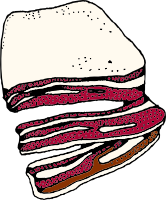Associations to the word «Bacon»
Noun
- Chicken
- Pint
- Buckingham
- Corn
- Fowl
- Salt
- Bun
- Custer
- Barbecue
- Pig
- Boston
- Perkins
- Franciscan
- Quart
- Advancement
- Baking
- Ingredient
- Hume
- Grit
- Smell
- Newton
- Relish
- Essay
- Gunpowder
- Kant
- Pie
- Oven
- Pastry
- Juice
- Aroma
- Edmund
- Cider
- Philosopher
- Voltaire
- Pan
- Utopia
- Mouthful
- Rebellion
- Boyle
- Ration
- Meal
- Pineapple
- Pizza
- Liver
- Essayist
- Menu
- Reginald
- Flavor
- Dripping
- Cake
- Vodka
- Sprout
- Raleigh
- Opus
- Cucumber
- Soup
- Calorie
- Ale
- Vegetable
- Induction
- Poultry
- Milk
- Bake
- Rene
- Dough
- Essex
- Mace
- Cereal
- Nicholas
- Villiers
- Thinker
- Albans
- Milton
- Chili
- Denny
- Alchemist
- Plato
- Erasmus
- Chunk
- Patty
- Boil
- Marlowe
- Experimentation
- Calf
- Berkeley
- Rafter
Wiktionary
BACON, noun. Cured meat from the sides, belly, or back of a pig.
BACON, noun. Thin slices of the above in long strips.
BACON, noun. A term of endearment.
BACON, noun. A saucisse.
BACON, noun. (slang) (derogatory) The police.
BACON, proper noun. A surname.
BACON AND CABBAGE, noun. (Ireland) A popular dish consisting of a large piece of boiling bacon simmered with cabbage and other vegetables such as onions, turnips and carrots. Served with the bacon sliced and much of the boiled liquid retained with the vegetables.
BACON AND EGGS, noun. A dish consisting of bacon and eggs, usually eaten for breakfast.
BACON BEETLE, noun. A beetle (Dermestes lardarius) which, especially in the larval state, feeds upon bacon, woollen goods, furs, etc.
BACON BEETLES, noun. Plural of bacon beetle
BACON RIND, noun. The tough outer skin of pork or bacon; pork rind.
Dictionary definition
BACON, noun. Back and sides of a hog salted and dried or smoked; usually sliced thin and fried.
BACON, noun. English scientist and Franciscan monk who stressed the importance of experimentation; first showed that air is required for combustion and first used lenses to correct vision (1220-1292).
BACON, noun. English statesman and philosopher; precursor of British empiricism; advocated inductive reasoning (1561-1626).
Wise words
Once a word has been allowed to escape, it cannot be
recalled.


.png)
.png)